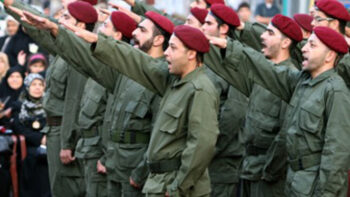By Mark Ellis —

Hezbollah is currently distracted by Syria’s civil war with 1/3 of its forces actively involved there to support Assad’s brutal reign. Thanks to Iran and Russia’s help to prop up Assad, his grip on power is stronger now than ever.
“This development will enable Hezbollah to shift its emphasis and resources toward Israel,” writes Ari Lieberman in FrontPage Magazine.
While Hezbollah has sustained significant casualties since it began its military effort in Syria – with at least 2,000 killed – the terror group has become stronger, militarily.
“It has been lavishly equipped by Iran with modern weapons, including T-72 tanks, weaponized drones, Kornet anti-tank missiles and Yakhont anti-ship cruise missiles, and thanks to the Russians, improved its electronic warfare and special operations capabilities,” Lieberman observes.
Currently, Hezbollah is estimated to have 100,000 to 150,000 missiles and rockets, more than the combined arsenal of all NATO countries, with the exception of the United States!
With Iran’s help, Hezbollah has built subterranean factories buried 160 feet below ground. These factories are capable of producing everything from small arms to Fateh-110/M-600 surface-to-surface missiles, making Hezbollah partially self-sufficient in arms, according to FrontPage Magazine.
Lieberman believes the money Iran received in the nuclear “deal” from the Obama administration has gone to nefarious purposes.
“Thanks to the Iran deal and concomitant cash infusion resulting therefrom, including $1.7 billion in ransom payments from the Obama administration, the Islamic Republic has successfully raised additional proxy Shia armies whose members include Pakistani, Afghani, Yemini, and Iraqi recruits. The largest of these militias is the Iraqi Hashd al-Shaabi, an 80,000 strong force that can easily be transported to Lebanon should Iran call upon them to fight,” Lieberman notes.
Political developments within Lebanon are also unsettling. “Hezbollah and by extension Iran, exercises near full control over Lebanese affairs and has fully absorbed Lebanese state institutions,” Lieberman charges. Lebanon’s president, Michel Aoun, “who is almost certainly on Iran’s or Hezbollah’s payroll, has expressed open support for the terror group.”
Hezbollah is also using civilian housing in southern Lebanon to store its weapons, providing homeowners with small sums of money in exchange for storage space.
“Armed conflict between Israel and Hezbollah is inevitable,” Lieberman concludes.
If Iran is attacked by the U.S. or Israel, it would use Hezbollah to fight back, drawing in Israel.
“A war could also begin if Hezbollah miscalculates by provoking Israel with a localized attack along the border. This was the case on July 12, 2006 when a Hezbollah border provocation resulted in full-scale conflagration.”
“In either case, Israel must not allow the initiative to rest with the enemy. As such, it must act preemptively or preventively to rob the enemy of this vital strategic asset. Hezbollah and Iran must not be allowed to dictate the war’s timing and location,” Lieberman notes.
He believes in the next war Israel will broaden the theater of operations to include Syria where Hezbollah maintains a significant presence. “Israel will commit itself to total war from the outset in shock & awe-like fashion with the aim of breaking Hezbollah’s back. This is a realistic goal that would have wide regional backing, particularly from Sunni states like Saudi Arabia, which views Hezbollah as a malign influence.”
“Israel would also receive considerable political support from the Trump administration, which is far more sympathetic to Israel than the previous administration.”
“The next Lebanon War will be brutal and devastating but will be fought with the achievable aim of breaking Hezbollah’s back and degrading its military capabilities to the point where Lebanon can once again reassert its sovereignty. Hezbollah may have dodged a bullet in 2006 but in the next war, it will not be so lucky.”
Ari Lieberman is an attorney and former prosecutor who has authored numerous articles and publications on matters concerning the Middle East and is considered an authority on geo-political and military developments affecting the region.



